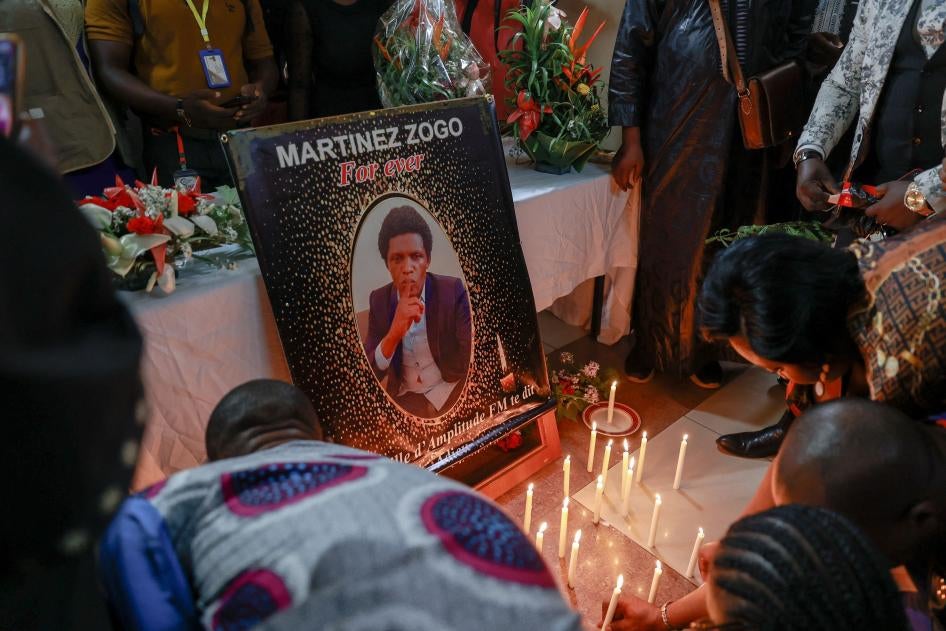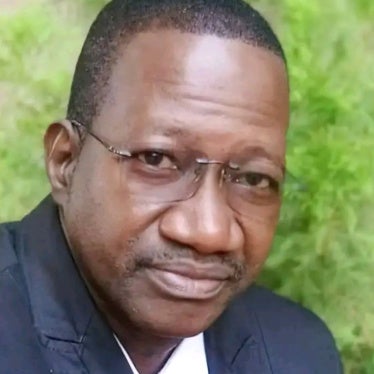Cameroonian authorities should conduct an effective and transparent investigation into the killing of Martinez Zogo, a leading investigative journalist, Human Rights Watch said today. Zogo, who was director of the radio station Amplitude FM, regularly exposed corruption through his work and, in the days before he was killed, spoke on the air about threats he faced.
Zogo’s body was found on January 22, 2023, in Soa, a suburb of the Cameroonian capital, Yaoundé. Media accounts said Zogo’s body showed signs consistent with severe torture, including “a broken foot, cut fingers.” One article said that “he received electric shocks, he was made to eat his feces, the tongue did not have its normal position….” Human Rights Watch has not been able to obtain an autopsy report. The government released a statement on January 22 stating that Zogo had “endured significant bodily harm.”
“Martinez Zogo was a journalist who took great risks to expose the truth about corruption,” said Lewis Mudge, Central Africa director at Human Rights Watch. “His heinous killing sends a chilling message to all other journalists in Cameroon. Cameroonian authorities should conduct a prompt and impartial investigation so that Zogo’s killers can be brought to justice.”
Zogo was last seen by colleagues on the evening of January 17, after he finished his work in Yaoundé. Police at their post in Nkol-Nkondi neighborhood said they heard a loud noise outside later that night and found Zogo’s damaged car by the gate, as if someone had tried unsuccessfully to drive through it. No one was in the car when the police arrived, but after Zogo’s body was found, the police speculated that he may have been trying to enter the post to seek protection from his assailants. Police reportedly assumed he was kidnapped from his car by the eventual killers.
Some sources told the Committee to Protect Journalists that neighbors said unidentified men had been seen outside Zogo’s home for several nights before his abduction. On January 18, Zogo’s wife discovered that the brakes on her car had been tampered with.
Zogo was the host of a popular daily radio program, Embouteillage (traffic jam). During his show, he regularly discussed corruption cases, at times accusing well-known people by name. In the weeks before he was killed, Zogo spoke on the radio of his work investigating embezzlement in public institutions and said he would name people involved. Human Rights Watch has seen a copy of a report Zogo allegedly submitted to judicial authorities before his death, in which he calls for an investigation into corruption by a high-profile person.
In January 2020, the former wife of a government official accused Zogo of defamation. The authorities opened a criminal investigation and arrested him. He spent two months in pretrial detention, was convicted and sentenced to two months in prison in March 2020, and then released for time served.
Zogo’s murder has been met with widespread condemnation, in and outside of Cameroon. The National Journalists Union (Syndicat National des Journalistes du Cameroun, SNJC) wrote of “consequences which further restrict freedom and security in our country” and said that, “Where are freedom of press, of opinion and of expression in Cameroon when working for the media puts you at mortal risk ?” Civil society organizations strongly denounced Zogo’s death and called for the support of the international community to ensure justice.
Communication Minister René Emmanuel Sadi has issued two media statements since Zogo’s murder, including one on January 22, stating that an “investigation was opened to find and bring to justice the perpetrators of this odious, unspeakable and inadmissible crime, which cannot be justified under any pretext” and insisting that Cameroon is a country that respects rule of law and where freedom of the press is guaranteed.
But Zogo’s murder only highlights the difficult working environment for journalists in Cameroon, Human Rights Watch said.
In August 2019, Samuel Wazizi, an English-speaking journalist working at a privately owned broadcaster, Chillen Muzik and TV (CMTV) was arrested in Buea, South-West region. Wazizi covered the conflict in the Anglophone regions as well as corruption cases. In early June 2020, the authorities announced that Wazizi had died in custody on an undetermined date. Wazizi had not been seen since his arrest by family members or his lawyer. Wazizi was accused of speaking critically on the air about the authorities and their handling of the Anglophone crisis.
Ahmed Abba, a journalist for Radio France Internationale (RFI), was arrested in July 2015 after reporting on activities by the armed group Boko Haram in the country’s Far North region. He was held incommunicado for three months and tortured before finally being sentenced to 10 years under anti-terrorism laws on the grounds that he had failed to report terrorism acts to authorities. His sentence was later reduced, and he was released in December 2017.
“Martinez Zogo’s killing should not be swept under the carpet,” Mudge said. “Cameroonian authorities should live up to the government’s own words and actively protect journalists, who risk their lives to do their work, and hold Zogo’s killers – and all others who intimidate media professionals – to account.”
|
News Release
Cameroon: Prominent Investigative Journalist Killed
Effective, Transparent Investigation Needed; Bring Killers to Justice
Your tax deductible gift can help stop human rights violations and save lives around the world.
Topic
Most Viewed
-
November 25, 2019
A Dirty Investment

-
June 3, 2025
“They’re Ruining People’s Lives”

-
December 21, 2023
Meta’s Broken Promises

-
January 25, 2024
“We’re Dying Here”

-
February 19, 2018
“All We Want is Equality”




